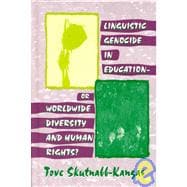
Note: Supplemental materials are not guaranteed with Rental or Used book purchases.
Purchase Benefits
What is included with this book?
| Preface | ix | ||||
| Outline of the book | ix | ||||
| How to use the book---some advice to the reader | xiii | ||||
| Who might want to read the book | xv | ||||
| Acknowledgments | xvi | ||||
| Introduction | xix | ||||
| Asking why-questions | xix | ||||
| Repoliticizing the language of schooling | xxii | ||||
| Acknowledging feelings, value judgements, and the need for action as legitimate parts of research | xxiii | ||||
| Standpoint theories | xxviii | ||||
| Linguistic genocide, language murder---a note on terminology | xxxi | ||||
| I Setting the Scene | 1 | (288) | |||
|
5 | (58) | |||
|
6 | (24) | |||
|
30 | (16) | |||
|
46 | (4) | |||
|
50 | (13) | |||
|
63 | (38) | |||
|
65 | (4) | |||
|
69 | (4) | |||
|
73 | (10) | |||
|
83 | (8) | |||
|
91 | (10) | |||
|
101 | (108) | |||
|
104 | (1) | |||
|
105 | (11) | |||
|
116 | (18) | |||
|
134 | (31) | |||
|
165 | (30) | |||
|
195 | (14) | |||
|
209 | (80) | |||
|
212 | (26) | |||
|
238 | (11) | |||
|
249 | (29) | |||
|
278 | (2) | |||
|
280 | (9) | |||
| II Linguistic Genocide, State Policies, and Globalisation | 289 | (188) | |||
|
291 | (88) | |||
|
296 | (15) | |||
|
311 | (7) | |||
|
318 | (47) | |||
|
365 | (14) | |||
|
379 | (98) | |||
|
384 | (41) | |||
|
425 | (11) | |||
|
436 | (32) | |||
|
468 | (9) | |||
| III Struggle Against Linguistic Genocide and for Linguistic Human Rights in Education | 477 | (192) | |||
|
479 | (88) | |||
|
482 | (14) | |||
|
496 | (9) | |||
|
505 | (6) | |||
|
511 | (16) | |||
|
527 | (15) | |||
|
542 | (7) | |||
|
549 | (8) | |||
|
557 | (10) | |||
|
567 | (84) | |||
|
570 | (5) | |||
|
575 | (4) | |||
|
579 | (21) | |||
|
600 | (22) | |||
|
622 | (4) | |||
|
626 | (12) | |||
|
638 | (13) | |||
|
651 | (18) | |||
|
652 | (1) | |||
|
653 | (2) | |||
|
655 | (5) | |||
|
660 | (4) | |||
|
664 | (2) | |||
|
666 | (3) | |||
| Bibliography | 669 | (66) | |||
| Bibliography of Esperanto Studies and Interlinguistics | 735 | (2) | |||
| Preface to Indexes | 737 | (2) | |||
| Author/Person Index | 739 | (16) | |||
| Languages and Peoples Index | 755 | (8) | |||
| Countries/States Index | 763 | (6) | |||
| Subject Index | 769 |
The New copy of this book will include any supplemental materials advertised. Please check the title of the book to determine if it should include any access cards, study guides, lab manuals, CDs, etc.
The Used, Rental and eBook copies of this book are not guaranteed to include any supplemental materials. Typically, only the book itself is included. This is true even if the title states it includes any access cards, study guides, lab manuals, CDs, etc.